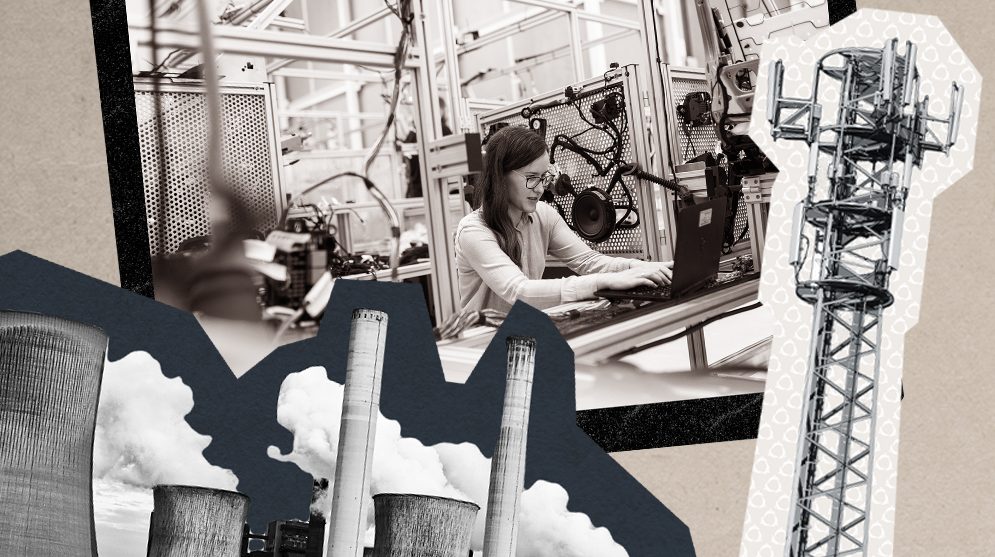The steam engine, the assembly line…5G? The much heralded fifth generation technology for broadband cellular networks will be central to the smart factory of tomorrow. So called ‘Industry 4.0’ will involve ever-increasing levels of automation, made possible by the Industrial Internet of Things (IIoT) and powered by 5G technology. Even as politics, pandemics and fake news provide obstacles for 5G to overcome, forward-looking manufacturing operations are recruiting individuals capable of harnessing the power it provides and maximizing its impact on productivity, safety and operational flexibility.
Capabilities of 5G and IIoT in Manufacturing
“It has been more than 200 years since the Industrial Revolution kickstarted the mechanized manufacturing industry, bringing mass-produced goods to market. Now, with the arrival of 5G technology, the sector faces its biggest transformation yet,” according to AT&T. “The fourth Industrial Revolution, often referred to as “Industry 4.0,” will usher in smart factories. In these futuristic factories, connected devices can sense their environments and interoperate with each other, making decentralized decisions. Many expect this transformation to rely on the underlying capabilities of next-generation 5G networks.”1
Advancements in 5G mean that wireless technology is finally ready to replace wired factory networks. As operational technology (OT) becomes increasingly integrated with information technology (IT) the need for speed increases. 5G’s impressive speed, low latency and reliability qualifies it for the job.
Erik Josefsson, Head of Advanced Industries at Ericsson, elaborates, “Manufacturing is facing numerous challenges and only marginal gains can be had through traditional cost-cutting measures. To optimize end-to-end value, a new connectivity foundation is needed to copy, monitor, and control the physical world.”2
Implication of 5G and IIoT in Production Operations Management
The implications of this evolution in manufacturing are overwhelming. The power of robotics and automation can be harnessed, productivity can be increased, quality control enhanced, inventory monitored and safety improved. Maximum benefit will come to operations that work to understand the breadth of new possibilities.
One such possibility is the realization of greater flexibility. As demand changes and custom manufacturing becomes more vital, the capacity for reconfiguration becomes a difference maker.
“The intelligent devices of today and tomorrow communicate wirelessly and their location is completely independent of data lines,” explains Gunther May, Director of Technology and Innovation at Bosch Rexroth AG. “The factory of the future must and will be extremely flexible. Only the floor, roof, and walls are fixed. Users can move machines, plants, and other devices and can assemble new production lines within a very short time.”2
A costly aspect of manufacturing that can be minimized by those who invest in the proper infrastructure is equipment downtime. 5G connected sensors will relay information such as vibration and noise data, which can be predictive of potential breakdowns. Machine learning algorithms can inform maintenance decisions aimed at preventing downtime. Once again, 5Gs speed, reliability and low latency enables the implementation of such systems.2
Maintenance and other highly specific technical tasks can be aided by augmented reality, another technology whose time has come.
“5G promises not only the streaming of high-quality instructions on the shop floor, but also stutter-free augmented reality that can guide people, step by step, through each individual motion they need to make. This will allow shop-floor workers to undertake advanced tasks without waiting for specialist engineers or incurring costly machine downtime. The best knowledge and work instructions can therefore be shared with all workers exactly when they need it, building worker skills more quickly, safely, and effectively than ever before.”3
The Politics of 5G
If the above sounds like a science-fiction movie come to life, the below may more closely resemble a James Bond flick.
The involvement of Chinese tech company Huawei in the rollout of various countries’ 5G networks has caused controversy and security concerns, as the United States and other allies work to ensure that their private information doesn’t wind up in the hands of the Chinese government. Then there’s the debunked but persistent rumour that 5G technology causes Covid-19.4 Arrested executives, international diplomatic breakdowns and medical conspiracy theories have meant that much of the press surrounding 5G has focussed more on politics and security concerns than technical specifications and potential benefits.5 While international supply chain cooperation will be vital to the widespread rollout of the 5G network, such complications will not prevent its eventual pervasive usage.
For production operations managers it’s imperative to stay current on smart technologies and to understand the implications that 5G technology will have upon them. Future planning should involve smart investments in the technological infrastructure itself as well as the recruiting and development of employees who can understand its potential and the structuring of a workforce designed to thrive within it.




